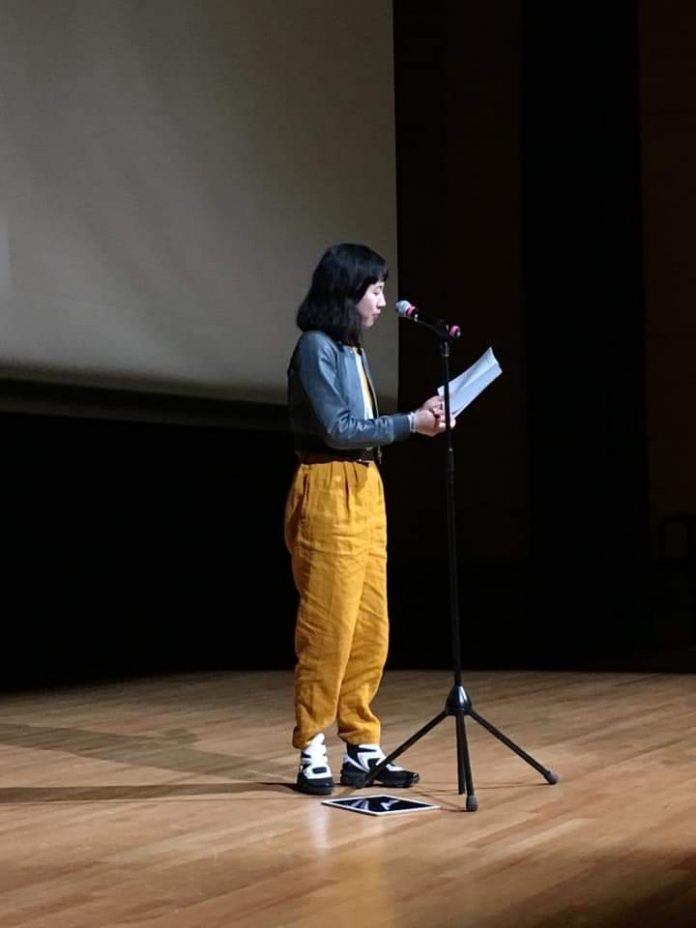As a queer, migrant Asian American, Jess X. Snow has uniquely expressed her own intersectionality in the fields of film-making, poetry and art. April 17, the Rhode Island School of Design graduate joined students for a presentation of intersectional expression through film and poetry. Held in Commonwealth Auditorium, the event was organized by the Rainbow Coalition and the Asian American Student Initiative and boasted a crowd of close to 50 students — each characterized by their own diverse social categorizations.
Following Snow’s brief introduction and welcome, she led the audience into a reading of her poetry, including new and old works.
“If sanctuary for a queer migrant is neither a place nor a nation on Earth, then I carve a permanent sanctuary in my work,” Snow said. “My work is heavily impacted by my relationship with my family as a queer migrant, our intergenerational trauma, the stigmatism around mental health in Asian and immigrant communities, and me and my mother’s long journey attaining green card status in the U.S. after cycling through a decade of temporary visas.”
She introduced her first poem as a depiction of queerness through the means of an informal oration of history and an explanation of the science and naturalness of her sexuality.
“Our queerness is an ancient persistence,” Snow recited in her untitled poem.
“So, tell me, that we are against nature and that our bones will remember that we have been queer for 3.6 billion springs, summers, falls and winters, and even long after an infant empire collapses into dust, we will still be queer.”
The audience erupted into a sea of snaps as Snow concluded the poem and thanked the audience.
“That’s a poem about the idea that queerness is against nature is not true,” Snow said. “I write a lot about animals, and I think the natural world is a perfect example of how nature is resilient, and we can look at nature to inspire cultural movements and revolutions.”
After the recital, the projector screen illuminated with the title of the opening film, “MOTHERLAND.” Set in a post-apocalyptic future, a migrant Latino man used the oxygen from the last plant on Earth and memories of his mothers to guide him to the discovery of how to preserve life on Earth.
Showed back-to-back, immediately following “MOTHERLAND” was Snow’s film “AFTEREARTH,” which was a collaboration with the Smithsonian Asian Pacific Center and Adobe Project 1324. “AFTEREARTH” focuses on the threatening force of rising sea levels and the fight four women give to preserve the oceans, land and air for future generations. The documentary was created by a majority LGBTQ+ cast and crew.
For the final film, Snow showed for the first time “SAFE AMONG STARS,” a film still in post-production. “SAFE AMONG STARS” dealt with rape, an extremely sensitive subject, and viewer discretion was advised at the start of the film. As a queer Chinese-American girl deals with trauma of her own rape, she struggles to find a way to tell her mother about what happened. “SAFE AMONG STARS” was heavily praised by the audience, as rape has become a more widespread topic of discussion in the media in recent years.
“This is really interesting,” Olivia Yang ’20 said. “From the films to the synopses and the rest of it, it’s all so exciting.”
Yang was not the only student who reacted positively. AASI and Filipino American Student Association members alike found great interest and excitement in the event. Jamelah Jacob ’21 and Rollin Woodford ’19 attended the event together. Both came in hopes of an enlightening event and left satisfied.
“I’m in AASI, and we brought Jess X. here, and as a fan of poetry in film, I knew I had to come,” Jacob said.
“I’m in FASA, and this event was talked about in some of our chats; it seemed to me like it dealt with some important issues, so I wanted to come, despite not being in AASI,” Woodford said.
Jacob then expressed her connection to the Asian and Pacific Islander American studies major and how the event was critical for her connection to the program.
“All of my interests intersecting in one event, I had to come,” Jacob said. “With the Asian American Student Initiative, we deal with social justice issues; we are a social justice organization here on campus. We try to uplift the community and work to bring attention to these issues in general. As an organization we advocate for the APIA program here on campus which is still trying to become a major and a minor; I hope that events like this can help generate a more positive response to the major.”
Snow’s immersive work in the cross-sections of fiction, fantasy, documentary and poetry have not only helped her but a vast population of intersectional Americans, according to students.
“I strive to create a home for people with traumas surrounding queerness, sexual assault, migration and displacement,” Snow said. “I hope my work can empower people to ultimately discover inside their own bodies — a sanctuary to heal.”

